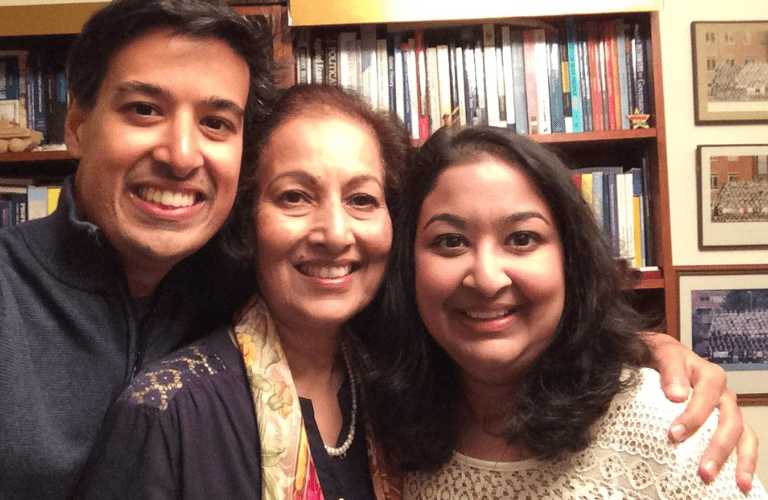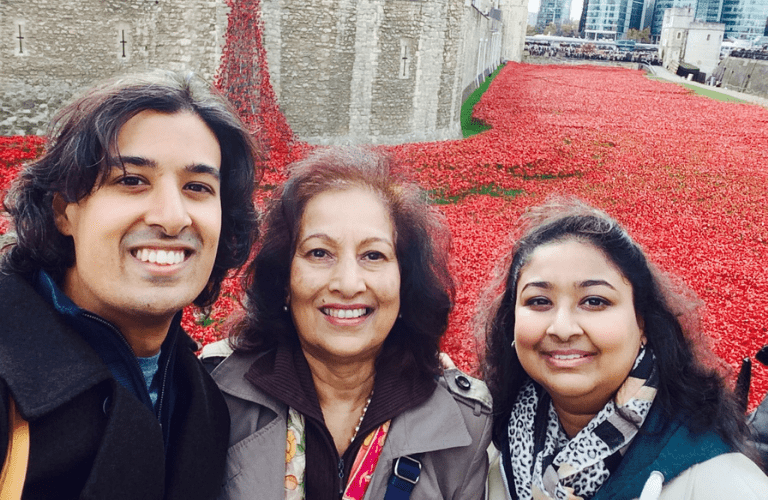Aqib and Shahbanu’s story: "We realised that mum’s comfort would be conditional on us understanding what was happening"
Brother and sister Aqib and Shahbanu share their story of how they support each other through their mother’s dementia.

Aqib, Shahbanu, and their mother, Shama, are as close as a family can be. From when they were growing up together to attending the same university, their mother’s devotion and support has been the foundation for all they have achieved.
When Shahbanu was diagnosed with an autoimmune condition in her first year at university, her mum was there for her. “Our mum has been an absolute rock throughout our lives and the most patient, caring woman. I had to have chemotherapy in my final year of university and she came to live with me so she could support me and take me to my hospital appointments,” Shahbanu says. And even after Aqib moved to the US for work, he visited as often as possible to see them, eventually, moving back to the UK to live with them during the pandemic.
Noticing changes in their mum
The changes in their mum seemed to take place overnight. Aqib and Shahbanu both noticed that their mum had started asking the same question several times in the space of a few minutes and that she was becoming a little more anxious and unsure of herself. And they had the characteristic difference of opinion amongst many siblings about what was going on.
“My sister was less quick to come round and I would get annoyed that she was burying her head in the sand, ignoring what could be something serious. And I would also get angry with her for losing her patience with mum about her forgetfulness,” Aqib reflects. “We ended up having several arguments, even in front of our mother, who would also get upset as a result.”
Shahbanu adds: “At the time, I also noticed the change—it was hard not to—but I strongly believed that her brain was simply recovering after a period of prolonged and intense stress. And so I said to myself that once she’s rested, it will be fine. And, of course, deep down, I just didn’t want to acknowledge it as something serious. I didn’t want it to be anything like dementia because it just didn’t seem fair.”
Getting a dementia diagnosis
Like many, both siblings inevitably turned to Google, looking up the symptoms and finding out what they could online, often swapping articles they had found to justify their differing positions or try to convince the other. “Even though we disagreed, we still shared everything we read with one another. Because, ultimately, we both had the same aim. To understand and help our mother,” Aqib said.
This lack of clarity and mounting worry caused them to turn to their mum’s physician who referred them to a Memory Clinic where Shama took the Addenbrooke’s cognitive exam (ACE) in April 2022. All the points she lost were on the memory portion, giving her a score well below what would be expected from someone like her with a graduate degree. And it was that day that Shama was given a preliminary diagnosis of Alzheimer’s disease, which was later confirmed following additional scans and tests in May 2022.
Even during that month before the formal diagnosis, Aqib and Shahbanu knew that family life would never be the same again. They realized they needed someone they could talk to as soon as possible. “It was as if the bottom had fallen out of my world. The future that I had imagined had evaporated—it was replaced by a fairly unknown and frightening one,” Shahbanu recalls.
Contacting the Closer to Home service
A quick Google by Shahbanu led them to the Closer to Home service on the Dementia UK website.
“We had made the decision early on that we needed to talk to someone about this as we just didn’t know how to process it,” Aqib mentioned. “We realised that mum’s comfort would be conditional on us understanding what was happening. The fact that we could attend this virtual appointment together at the same time whenever we wanted, suited us perfectly. And where we have had competing viewpoints, having an expert like Dementia UK’s Admiral Nurses to clarify and explain has been so helpful.”
Support from Admiral Nurse Ruby
From the first appointment, they were drawn in by Admiral Nurse Ruby’s warm, sympathetic and empathetic nature. She gave them both tailored advice to various challenges they were facing in their mother’s care, particularly when their mother would cook for them at inappropriate times.
“Mum has always focused all her attention on looking after the family. We felt that she shouldn’t look after us to such an extent now that we’re all adults, particularly with the dementia. Ruby said however that if she’s worrying about us and that’s what she’s used to doing, then we should let her do it. Having this confirmation of this being mum’s purpose was invaluable in empowering her,” Shahbanu says.
Aqib and Shahbanu also learned useful information from the specialist nurse which allowed them to get a deeper understanding of what was going on in their mum’s mind. “Ruby highlighted that we should stop questioning her by saying such phrases like ‘Do you remember?’ Or insisting that something happened,” Aqib said. “The analogy that Ruby gave us was that if someone—even a loved one—were to come up to me and say that I had run over a person and I had no memory of it, then I wouldn’t believe them and, as a result, the trust is eroded. We’ve realised that mum needs to have full trust in us, without which it will be harder to manage. I know that the ability for her to retain memories will be lost over time, so it’s important that she trusts what we are saying to her and that we have her best interests at heart.”

Aqib is conscious that he will have to return to the US for work at some point. And Shahbanu’s autoimmune condition limits her own ability to support her mother and makes her mindful of having too much contact with others. And so they’re both extremely grateful for the virtual and personal nature of the Closer to Home service that is available to them in both circumstances.
For anyone who is wondering about whether they should access the Closer to Home service and how they should go about it, Shahbanu mentions: ‘I’d say give it a go. Click the book now button, find a time which suits yourself, and spend a little time before the appointment listing any questions or concerns you have. Be relaxed and comfortable enough to talk about anything and everything with the Admiral Nurse. They’re not going to judge you or talk down to you – they’re there truly there to help and can make the world of difference.”
Closer to Home is a a service funded by Leeds Building Society that provides families with the vital opportunity to access dementia support from specialist nurses virtually or over the phone at a time which suits them.
